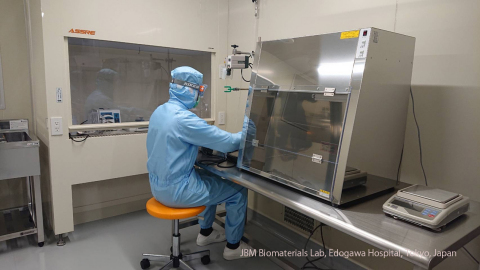Treating male urethral stricture with the patient’s own buccal mucosal cells, encapsulated in a polymer scaffold as a carrier, has been granted a patent in Japan. A longer duration of relief to patients who had a recurrence of the disease after earlier conventional treatments have been reported by this method called “Bees-Haus.”
Male urethra, a tubular passage to let the urine out from urinary bladder, when affected with narrowing or stricture of the lumen, causes difficulty in avoiding urine, urinary retention, and pain during micturition. Treatments include dilatation with balloon or urethrotomy under endoscopy at early stages and surgical urethroplasty under general anesthesia using patient’s autologous oral/buccal tissue graft in severe disease or long segment stricture. After surgery, for a while, patients pass urine through catheter drainage and complications such as stricture recurrence, urinary tract infection, impotence, sexual dysfunction, and incontinence, have been reported (Gallegos & Santucci F1000Res. 2016;5-2913 & Barbagli et al. European Urology Supplements 2016;15-1).
Bees-Haus method of cell therapy could be performed in two-steps, both as a daycare procedure. A small bit of patient’s oral tissue is taken, cells cultured in the lab, and transplanted through endoscopy. Very simple and convenient for urologists and relatively painless to patients with shorter hospital stays reducing healthcare costs and burden, because of lesser complications, making Bees-Haus easy to adopt. A larger multicentric study is under a proposal by JBM Inc, to validate its efficacy to make this a routine procedure to benefit many patients with a better quality of life.
Urethral stricture disease occurs mainly in men and its incidence climbs sharply after 55 years in the western population. An estimated 0.6% in susceptible populations are affected in which 4% of male patients require an interventional procedures. Annually 200 million USD is spent in the USA for urethral stricture treatment, which doesn’t include the cost of medication. The Americas hold the largest share in the global urethral stricture market, followed by Europe and the Asia Pacific. JBM has applied for patents worldwide including USA, EU, United Kingdom and are looking for country-wise partners for technology licensing out. JBM also established a biomaterial laboratory to develop novel scaffolds for various applications in regenerative medicine, implants, and medical devices in Tokyo.

 Hybrid Cell Therapy or HCT is a painless & simple day-care procedure suitable for global reach
Hybrid Cell Therapy or HCT is a painless & simple day-care procedure suitable for global reach












.jpeg)








.jpeg)





.jpg)


.jpg)



